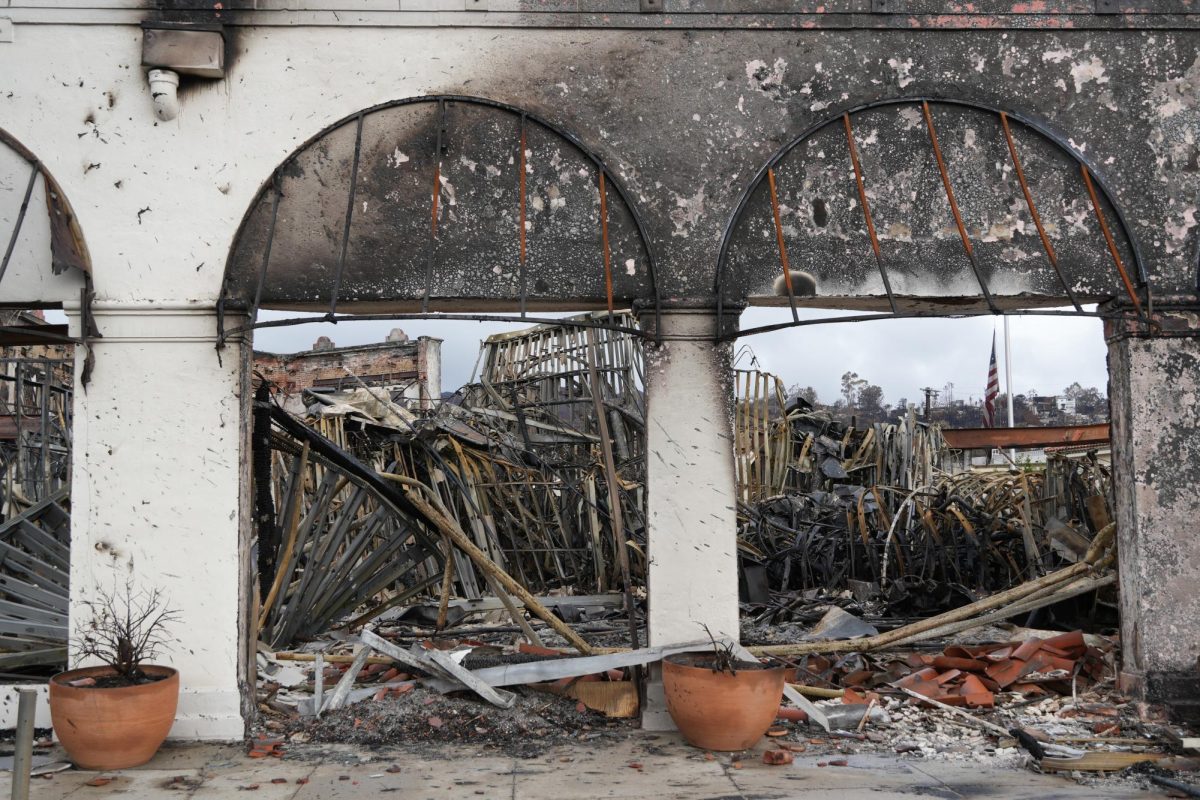Over the summer
Since the election of President Donald Trump, there has been a dramatic increase in immigration enforcement, legalized racial profiling and arrests across the country’s urban epicenters, particularly Los Angeles. The “One Big Beautiful Bill,” now Public Law No. 119-21, was passed in July and allocated a significant amount of government funds to the U.S. Immigration and Customs Enforcement (ICE). This bill was a culmination of Trump’s consistent efforts to “crack down” on undocumented immigrants, primarily by means of mass deportation. Across the country, ICE has unlawfully seized, detained and questioned countless American citizens and residents, particularly those of Latine heritage.
In order to limit the ICE raids, the American Civil Liberties Union (ACLU) of Southern California applied for two temporary restraining orders against the Department of Homeland Security and Immigration and Customs Enforcement. The first restraining order prevents ICE from confronting individuals without reasonable suspicion. “Reasonable suspicion” was limited by four factors, which were outlined by the ACLU. The factors include apparent race or ethnicity, speaking Spanish or English with an accent, presence in a location that may be frequented by undocumented immigrants and occupation. The four factors were, according to the restraining order, not a basis for reasonable suspicion and thus unacceptable reasons to confront, detain or question an individual. The second restraining order addressed ICE’s withholding of legal representation of detained individuals and required them to have access to contact legal counsel. Although helpful in theory, these restraining orders went largely unenforced in Los Angeles County, and the Latine community continued to bear the burden of racial profiling and unjust violence.
The violence that proliferated over the summer reached a pinnacle on Sept. 8, 2025 when the Supreme Court of the United States lifted the restraining order that prevented racial profiling and unlawful stops. It was decided by the Supreme Court that racial stereotypes that disproportionately affect Latine individuals are deemed acceptable suspicion for seizure, detainment and questioning by ICE agents. In Los Angeles County, the primary focus point of President Trump’s immigration efforts, those who self-identify as Hispanic or Latine account for 47% of the population, according to the United States Census Bureau in 2020. Nearly half of the population of Los Angeles County is at risk of being stopped by ICE, regardless of their citizenship status, history or who they are or how they got here.
Speaking with OLE
Considering the Los Angeles environment that is made up of 47% Hispanic people, Marlborough’s 5.9% Hispanic students (according to the High Achieving Schools Survey administered to students annually) out of the entire student body of 580 is disproportionate to the greater Los Angeles area. Not only that, but the percentage of Latine students at Marlborough is considerably less than the 22.1% average of Latine students in Los Angeles private schools.
The lack of representation for Latine students within the demographics of Marlborough has led to the lack of cultural representation for Latine students. Organized Latinx Exchange (OLE) community partnerships representative Lucia ’27 commented on how the lack of physical and cultural representation has hurt Marlborough in a lot of ways.
“Because there is so much power in numbers, Latine students feel undervalued, or like their stories don’t matter, because there are fewer of us,” Lucia said. “At the same time though, it’s powerful to see so many Latine and non-Latine students come together to support our push for more representation and reminds me of just how incredible the Marlborough community is.”
OLE members Kika ’26 and Sophia ’27, when confronted with the underrepresentation of Latines at Marlborough formed a subcommittee of OLE dedicated to bringing these issues to the attention of the administration and the Board of Trustees. The committee plans to present to a committee of the board later this year in hopes of jump-starting efforts to increase demographic representation for Latines at Marlborough. Kika commented on the importance of this committee in the greater process of increasing diversity at Marlborough.
“This issue stems much further than ‘getting more Latinas’ to attend Marlborough, which is why we wanted to go to the people who have the most executive authority,” Kika said. “We have to think about which neighborhoods the bus-routes ignore, the tendency of [Marlborough] to accept high amounts of students from “feeder” schools that already have an underrepresentation of Latinas, where admissions outreach is being done, etc.”
Another important aspect of inclusion is via cultural representation, which can be created through curricular and cultural aspects of the school community. OLE, the affinity group for Latine identifying Marlborough students, is a key pillar for the Latine community at Marlborough. Meeting on the first Tuesday of every month, OLE meetings range from engaging activities to meaningful conversations. OLE member Mila ’26 spoke to the importance of OLE in creating a community for herself and Latine students alike at Marlborough.
“Raising awareness for the Latina community, especially at an all-girls private institution like Marlborough, and building community within the few of us here is important so we can look to our heritage and culture with honor and pride,” Mila said.
Additionally, the incorporation of Latine stories and narratives into the curriculum fosters greater awareness of the Latine community. Honors English IV: Latinx/Latine Literature, taught by English Instructor Danny Robles, is one of the senior English electives and is a semester-long examination of the Latine experience. Additionally, Latine narratives are incorporated into a variety of other English courses at Marlborough, including Honors English IV: California Literature taught by English Instructor Ashley Muñoz. Muñoz commented on how Latine literature being incorporated into the English curriculum is a valuable way to incorporate the Latine narrative into the Marlborough experience.
“When centering Latine identities, an identity that I not only inhabit, but strive towards including in my curriculum, it’s important that I set this precedent of unity and interconnectedness,” Muñoz said. “My hope is to amplify the many Latine experiences in American history that are often overlooked and present it as the essential part of the American story that it is, rather than a monolith.”
Another means to amplify the Latine voice at Marlborough is through speakers for the entire school. On Sept. 17, Marlborough welcomed Diana Tellefson Torres, a leader of the United Farm Workers Movement for over a decade and a nonprofit consultant. Torres spoke to the Marlborough community about both her background and experience being Latine, as well as the current policy changes affecting immigrants and farmworkers in the United States. When asked about the importance of representation within a community to enact change, Torres commented on the importance of acknowledging the diversity within the Latine community in decision-making processes.
“Latine people come from all kinds of countries — people could be immigrants, they could be asylum seekers, they could have been born here, they could be from different economic status — there’s a lot of different lived experiences within the Latine community,” Torres said. “When decisions are being made, it is always important to hear from the people that are going to be impacted by any decision, and it is important to have the decision makers representing diverse communities within a group.”
Diversity moving forward
“Schools have a responsibility to be safe havens. While we cannot control national immigration policies, we can do our part to make sure that Marlborough is a place where students from all backgrounds feel secure, supported and affirmed,” Director of Equity, Community and Belonging Kelly Jackson said.
As a critical part of the Marlborough community, Jackson works to ensure that students and staculty are supported as the U.S.’s immigration policies affect millions of lives in the Los Angeles community, with nearly half of the population identifying as Latine. As prevalent issues of identity, equity and justice have circulated in the news, impacting the lives of every individual on campus at varying levels, a school’s role is vital. Jackson builds structures within our community to promote inclusivity, such as working with affinity groups and supporting staculty in inclusive teaching practices. Advocacy and support remain her top priorities as the nation’s politics around us continue to change and threaten our community.
During this critical period of injustice the Latine community currently faces, the reality is different for every individual impacted. The administration works to provide resources to advocate for inclusive measures, one of which is education. As students’ recieve their news from social media, they are exposed to biased and misinformed news. Marlborough organized the All-School Meeting with Torres in September, serving as a powerful reminder of real human experiences and injustice reflected to many in our own community as well. It unfolded her personal anecdotes of racial profiling, ICE raids and questioning what is truly constitutional. Systemic inequalities, no matter the scale, should be represented in a way that is honest and informative because it is from there that ignites and strengthens advocacy, and in which impacted individuals can feel seen and truly supported.
In addition to education on this vital subject, the school partners with families and community organizations to support students and staculty that are directly impacted by these policies. Bridging these connections between the students and the administration promotes a community where diversity and inclusion are essential.
Although not every individual on campus is directly impacted to the same extent of the Latine community, Jackson said that especially in these moments when national rhetoric can be divisive or harmful, representation and respect remain key to promoting inclusivity. “Appreciating the Latinx community, and all communities, reminds us that diversity is one of our greatest strengths,” Jackson said. “It challenges stereotypes, helps dismantle prejudice and affirms the humanity of groups that are often misrepresented.”
Rita ’27 described the importance of diversity, especially in academic environments.
“Diversity is essential in schools because it adds different perspectives and backgrounds to every classroom, shifting students’ understanding of various topics,” Rita said. “Most importantly, diversity helps students to build respect and foster relationships with one another, regardless of race and ethnicity.”










